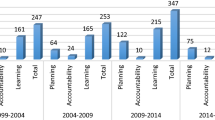Summary
Evaluations should be independent in terms of being able to arrive at impartial conclusions. They must be seen as being credible if they are to fulfil this function. Their impartiality is derived from using appropriate scientific methodology and by being protected from political interference. Within the government, evaluation offices should be lodged in independent agencies located close to decision makers, but not in the same office as the programme being evaluated. Scientific methods that protect against various forms of bias should be derived with assistance from the professional evaluation community.
Similar content being viewed by others
References
Boston, J., et al. 1996.Public management: the New Zealand model, Oxford, U.K., Oxford University Press.
Henkel, M. 1991.Government, evaluation and change. London, Jessica Kingsley Publishers.
House, E.R. 1997. Evaluation in the government marketplace.Evaluation practice (Greenwich, CT), vol. 18, no. 1, p. 37–48.
— 1980.Evaluating with validity. Beverly Hills, CA, Sage Publications. [in Spanish:Evaluación, ética, poder. Madrid, Morata, 1994.]
—; Haug, C.; Norris, N. 1996. Producing evaluations in large bureaucracies.Evaluation (London), vol. 2, no. 2, p. 135–150.
Norris, N. 1995. Contracts, control, and evaluation.Journal of education policy (Basingstoke, UK), vol. 10, no. 3, p. 271–285.
Osborne, D.; Gaebler, T. 1992.Reinventing government. Reading, MA, Addison-Wesley.
Wilson, J.Q. 1989.Bureaucracy. New York, Basic Books.
Additional information
Original language: English
Ernest R. House (United States of America) Professor at the School of Education, University of Colorado, Boulder. His interests are in evaluation and policy. He has been a visiting scholar at UCLA, Harvard and New Mexico, as well as at universities in Australia, Austria, Spain, Sweden and the United Kingdom. Recent publications include;Professional evaluation (1993), Schools for sale (1998) andValues in evaluation and social research (with K. Howe). He has been a recipient of the Lasswell Prize (1989) for the article contributing most to the theory and practice of the policy sciences and of the Lazarsfeld Award (1990) for Evaluation and Theory, presented by the American Evaluation Association.
About this article
Cite this article
House, E.R. Institutional arrangements for evaluation. Prospects 28, 109–116 (1998). https://doi.org/10.1007/BF02737783
Issue Date:
DOI: https://doi.org/10.1007/BF02737783




